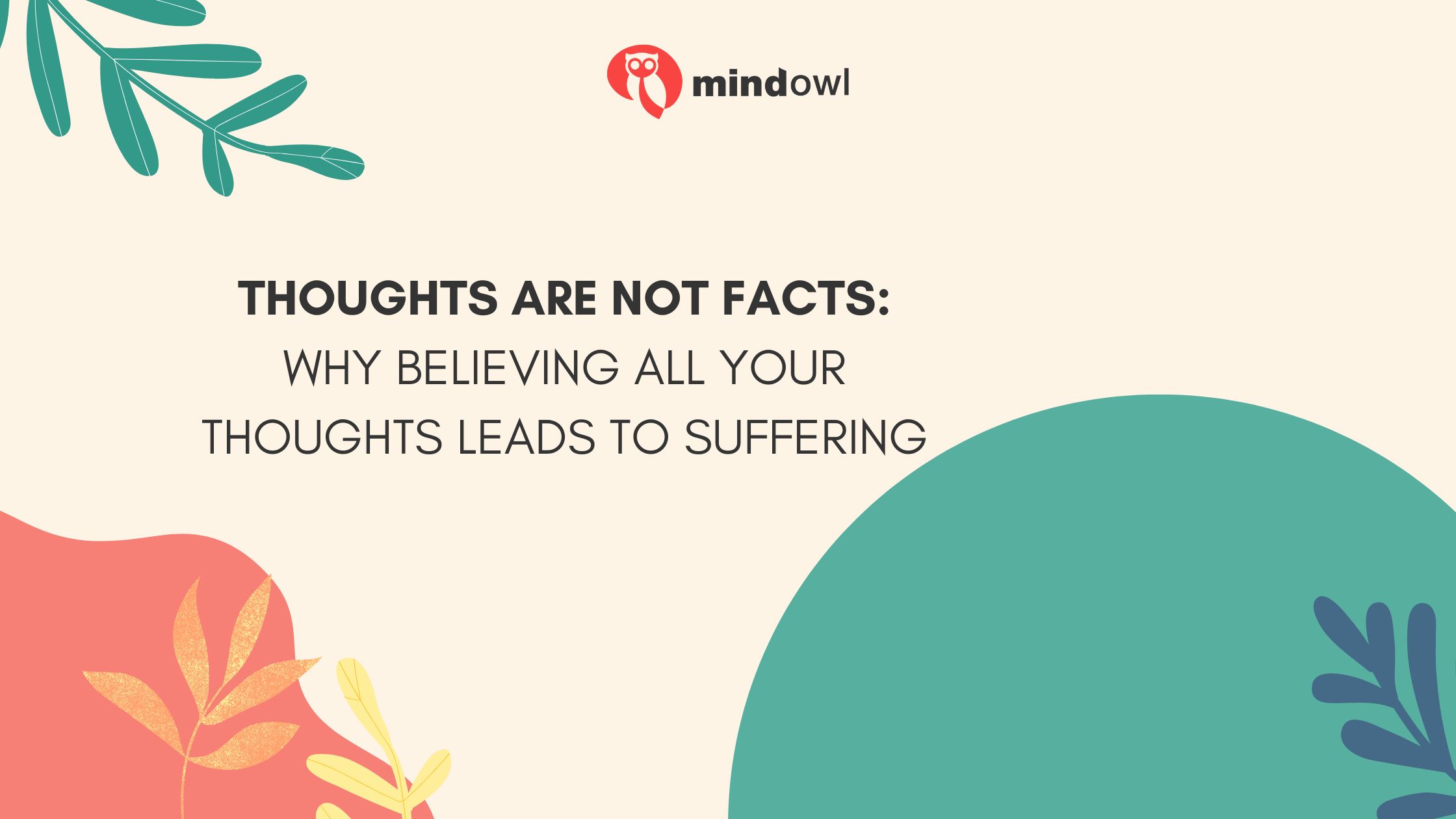
Our thoughts have an incredible power to shape how we see the world. When we believe our negative thoughts are absolute facts, it can reinforce anxiety, depression, and stress. However, these cognitive distortions do not show us objective reality.
Mindfulness practices teach us that thoughts come and go, without defining the totality of a situation or our worth. Recognising that thoughts are not always facts helps to reduce suffering and reactive emotional patterns. With more awareness and wisdom, we can then choose which thoughts to focus on to shape a more positive reality aligned with our deepest values.
This blog will explore tools from cognitive behavioural therapy and mindfulness to challenge negative rumination and see situations more clearly.
Key Takeaways
- Thoughts are not facts; they’re just mental events influenced by our emotions and past experiences, whilst facts stand on their own and can be proven.
- If we believe every thought is true, it can cause anxiety, lead to impulsive decisions, and affect how we view reality. Mindfulness helps us recognise this.
- Naming your thoughts can help you manage them better. Considering other perspectives also lets you see the full picture.
- Talking to friends, family or getting professional help is important when dealing with tough thoughts. This support can guide you through hard times.
- Challenging negative thinking patterns improves mental well-being. Remember that your mood can change how you interpret things around you.
The Difference between Thoughts and Facts

Thoughts are mental events that can be influenced by our mood, past experiences, and beliefs. On the other hand, facts are objective and verifiable pieces of information that exist independently of our thoughts or feelings.
Understanding this distinction is crucial for managing our mental wellbeing effectively.
Thoughts are mental events
Our minds are like busy factories, always producing thoughts. These thoughts pop into our head without an invitation. They can be about the past or the future, and often they’re just guesses or worries.
Recognising that these mental events come and go helps us keep a healthy distance from them.
Imagine your brain as a sky, with thoughts passing by like clouds. Some are fluffy and light; others are stormy and dark. But no matter their shape or size, clouds aren’t the sky itself – they pass through it just like our mental events drift through our mind without defining who we are.
Facts are objective and verifiable
Facts stand on solid ground because we can prove them. You see, hear, touch, or measure a fact. Take the height of Mount Everest for instance – it’s not just an idea; it’s measured and agreed upon by explorers.
This kind of information is powerful. It helps us argue well and think sharply.
Knowing what is true makes you smart and confident in your talks with others. Facts don’t depend on feelings to exist; they simply are, whether we like them or not. Next up, let’s find out how mixing up thoughts with facts affects us all.
The Impact of Believing Our Thoughts as Facts

Believing our thoughts as facts can lead to distress, anxiety, and impulsive actions. It also affects our perception of reality, leading us to make decisions based on inaccurate information.
Causes distress and anxiety
Thinking thoughts are facts can make us feel very anxious. If you see a friend frowning and think they’re mad at you, it might worry you. But maybe they just have a headache! When our head fills with negative self-talk, we might start thinking we’re not good enough or that everyone’s against us.
This can really upset us.
Being aware of these thoughts is key to keeping calm. It helps to know that sudden, unwanted thoughts don’t control what happens to us. If your mind says something unkind about you, that doesn’t make it true.
You might feel scared or sad if you listen to these thoughts too much. Mindfulness practice can help stop this from happening and keep anxiety away.
Can lead to impulsive actions
Believing thoughts are facts can push us to make hasty choices. Our minds might tell us we must act right away, even when waiting could be better. This quick action can lead to poor decisions, as we don’t think about what might happen next.
For example, imagine you feel a wave of anger and before you know it, you’ve shouted at a friend. You acted without pausing to see if your thought was true or necessary.
Taking time to consider our thoughts helps avoid acting on every impulse that pops up in our heads. We can learn to notice these sudden ideas and question them before they turn into actions.
If your mind jumps to conclusions, try stepping back and looking for the fact behind the feeling. That way, we’re less likely to rush into things that may not help us in the long run.
– Affects our perception of reality
Affects our perception of reality
Our beliefs shape the way we see the world. They can change how we think, feel, and act every day. When our energy is low or we’re hungry, what we think might not be clear. It’s like wearing glasses that don’t fit right; everything looks blurry.
Understanding this can help us make better sense of things around us. We start to know that not all our thoughts are true. Our mood sways what we believe. If we’re happy, things look bright.
But if we’re sad, they may seem darker than they are.
It helps to check in with ourselves sometimes. We ask “Is this thought a fact or just my feeling?” This lets us deal with life in a healthy way and keeps us from getting too anxious or down.
How to Challenge Our Thoughts
To challenge our thoughts, we can start by identifying and labeling them. Consider alternative perspectives and practice mindfulness to gain a clearer understanding of our thought patterns.
Seeking support from friends, family, or professional help can also aid in challenging negative thoughts.
Identify and label thoughts
Label your thoughts to manage them better. This means you pay attention and give names to the different thoughts that come into your mind. Call a thought what it is – maybe it’s a worry, a memory, or just an idea.
Recognising our thoughts helps us see they’re not facts.
You can track how your mood shifts with different kinds of thinking. If you name a thought “negative,” you remind yourself it doesn’t reflect reality as it truly is. With practice, this skill helps you handle mental events without letting them control you or lead to distress and anxiety.
Use this technique next time your mind jumps to conclusions; it could keep anxiety or depression at bay.
Consider alternative perspectives
Sometimes we see things one way, but there could be other ways to look at them. These different views can help us find the truth about our thoughts. Think of your mind like a TV with many channels.
Just because it’s showing one channel doesn’t mean you can’t change it and see something else. Let’s say a friend didn’t wave back to you. You might think they’re angry at you, but maybe they just didn’t see you.
You can also play detective with your own thoughts. Ask yourself if there are facts that prove what you’re thinking is true or not. Remembering that our moods affect our thoughts helps too.
If we’re feeling sad, we may only see the bad side of things. By looking for different explanations, we learn that what goes on in our head isn’t always right. This skill is part of therapy called cognitive therapy and it really helps people feel better about life.
Practise mindfulness
Engage in mindfulness to challenge and reframe your thoughts. Recognise that thoughts are mental events, not necessarily facts. By being mindful, you can identify when your mind jumps to conclusions or spirals into anxiety.
Use mindfulness meditation to cultivate awareness of your thoughts and emotions, reducing biased thinking and promoting a balanced perception of reality. With mindfulness practice, you can develop the ability to step back from automatic reactions and check where your head was at the time, leading to improved mental clarity and well-being.
Applying self-compassion through mindfulness meditations gives us the space to reflect on our thoughts without judgement, fostering a healthier relationship with our internal dialogue.
Seeking Support and Seeking Help
Seeking support and seeking help is crucial for managing and challenging our thoughts. Whether it’s reaching out to friends and family or seeking professional help, having a supportive network can make a significant difference in our mental well-being.
To learn more about how to challenge your thoughts and the impact of believing them as facts, keep reading this insightful blog.
Reach out to friends and family
When you’re struggling with mental health challenges, reaching out to friends and family can provide crucial support. Talking openly about your feelings can not only help in finding guidance but also reduce the sense of isolation often associated with mental health issues.
Social support is vital – it plays a significant role in promoting psychological well-being and enables individuals to seek help when needed. Furthermore, public health campaigns encourage seeking assistance from loved ones as an effective way to cope with mental health problems, emphasising that asking for help is challenging, yet essential.
Positive social interactions also play a crucial role in building resilience against depression and anxiety. Research shows that people who have strong connections tend to have better mental well-being overall.
Seek professional help
Seeking professional help for mental health concerns is crucial. Professional assistance can provide effective strategies and support to manage mental illnesses, including anxiety and depression.
It’s essential to recognise that seeking help is a strength, not a weakness, and it can lead to greater well-being and improved quality of life.
Remember, barriers such as stigma or lack of resources should not deter you from reaching out—for there are professionals who are equipped with the necessary expertise to offer appropriate care tailored to individual needs.
Conclusion
In conclusion, understanding that thoughts are not facts is crucial for our mental well-being. Challenging our thoughts helps us to see them clearly and choose which ones to believe.
By realising the distinction between thoughts and facts, we can improve mindfulness and navigate through our day with confidence. It’s essential to remember that our thoughts are subjective mental events and shouldn’t always be treated as reality.
Recognising this enables us to make progress and enhance our mental health.
FAQs
1. What does the phrase “thoughts aren’t facts” mean?
The phrase “thoughts aren’t facts” tells us that our thoughts are just mental events that pop into our heads and they don’t always show what’s real.
2. Why might someone believe their thoughts are facts?
Sometimes, when your mood changes, you may believe incorrect thoughts to be true without checking if they match reality.
3. How can I tell if my thought is a fact or not?
Pause and check to see where your head is taking you; consider whether there’s evidence for your thought or if your mind jumps to a conclusion.
4. Can believing all our thoughts cause problems?
Yes, if we treat every thought as truth, we might spiral toward depression or anxiety when those thoughts fail us or knock down our confidence.
5. How can understanding that ‘thoughts aren’t facts’ help with self-care?
Realising this helps stop constant worry since you’re able to see that just because you think something like “everyone else is better than me,” it isn’t necessarily true.
6. What strategies can help me deal with unhelpful thoughts?
Mindfulness-based techniques like MBCT (mindfulness-based cognitive therapy) and MBSR (mindfulness-based stress reduction) train us to recognise and be curious about our thoughts instead of accepting them as truths right away.
MindOwl Founder – My own struggles in life have led me to this path of understanding the human condition. I graduated with a bachelor’s degree in philosophy before completing a master’s degree in psychology at Regent’s University London. I then completed a postgraduate diploma in philosophical counselling before being trained in ACT (Acceptance and commitment therapy).
I’ve spent the last eight years studying the encounter of meditative practices with modern psychology.

